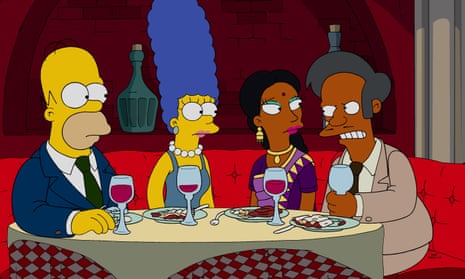After progressively diminishing the character, it appears that The Simpsons might be gearing up to drop Kwik-E-Mart clerk and Indian-American icon, Apu Nahasapeemapetilon.
Well, kind of Indian-American. He’s a brown character with an exaggerated Indian accent voiced by a white guy (Hank Azaria).
Apu has gotten a lot of flak lately for being racist depiction of Indian-Americans. One of my favorite comedians, Hari Kondabolu, even released a documentary about it (The Problem with Apu) last year.
But growing up in the 1990s, Apu was something of a hero for me. I watched hundreds of Simpsons’ episodes back then and thousands of scenes are seared into my mind – but none more than the end of a season four episode.
Homer decides to skip church, and falls asleep at home while smoking a cigar. He almost dies in the ensuing fire, but he’s saved by Apu – chief of the volunteer fire department – and a host of other characters. Reverend Lovejoy tells the relieved Homer that God didn’t set his house on fire but that he certainly was working through the hearts of his friends – Christian (Ned Flanders), Jew (Krusty the Clown), and “miscellaneous” (Apu) alike.
Hindu! Apu objects. There are 700 million of us.
It felt nice as a member of tiny minority in a mostly white and Christian country to be reminded that there were almost a billion other people on Earth who had to learn bhajans, suffer through seemingly interminable pujas, or touch their elders’ feet as a sign of respect.
To be represented at all seemed like progress. My relationship with Apu was like my relationship with my Indian-born father or my Indo-Trinidadian mother: filled with moments of cringeworthy embarrassment (among others, we used to call erasers “rubbers” in the house, which didn’t go over well in middle school), but also moments of pride and gratitude.
Apu was an emotionally developed character, much more so than other Simpsons characters, he cared about his family and worked tirelessly to support them. He was also allowed to be zany and kooky – he wasn’t just there in the background, he had his own plotlines, he was neurotic, unique, not just a prop for diversity.
The United States is incredibly economically divided today, but perhaps no group more so than Indian-Americans. We’re either pumping your gas or we’re performing open-heart surgery. For Indian-American actor Utkarsh Ambudkar having Apu represent us is a disgrace. An “idiot, potbelly dude, who can’t even speak English”. Obama-era surgeon general Vivek Murthy expresses similar shame in Kondabolu’s documentary.
It would seem that the solution is to have every media depiction of an Indian guy in America be Kal Penn playing a doctor. But a lot of us pump gas too. A lot of us say things like “Thank you come again,” because good service counts when you’re living on the razor edge of a society that doesn’t care about struggling people – wherever they’re originally from.
Kondabolu, to his credit, is nuanced throughout the documentary and has expressed dismay at the idea that killing off Apu would be a solution to “the Apu problem”. But his film never can really tell us what he wants to see – it’s just circular complaints about representation.
In its worst bits, Kondabolu’s documentary compares Apu to a blackface minstrel show, as if there was no difference between the experience of black Americans and that of South Asian immigrants then or now. “We’re all PoCs fighting against the white man,” might attract applause from today’s liberal commentariat, but it’s a glib and ahistorical understanding of oppression in America.
It might have helped if Kondabolu spoke to a different set of people about what Apu meant to them. The Problem with Apu mostly interviews famous Indian-American actors. The people who seem the least fazed by seeing an Apu clip are Kondabolu’s parents. I imagine most Indian-Americans feel the same way.
But hey, luckily we got more than Apu nowadays. We got Mindy Kaling, Aziz Ansari – and don’t let the white devils make you forget that Sir Ben Kingsley is really Krishna Pandit Bhanji.
That said, I’ll cling to my best memories of Apu. In an episode from season seven of The Simpsons, our Indian hero faces possible deportation after a xenophobic campaign is whipped up by Mayor Quimby. In solidarity, Homer builds support against the mayor’s anti-immigrant proposition and Lisa helps Apu pass a citizenship test.
After becoming a citizen, Apu gets a letter summoning him to jury duty. He casually throws it in a wastebasket. I can’t think of a better depiction of a person of color in the media – neither an object of scorn nor fetishized, just trying to get by like everyone else.
Bhaskar Sunkara is a columnist for the Guardian US and the founding editor of Jacobin
